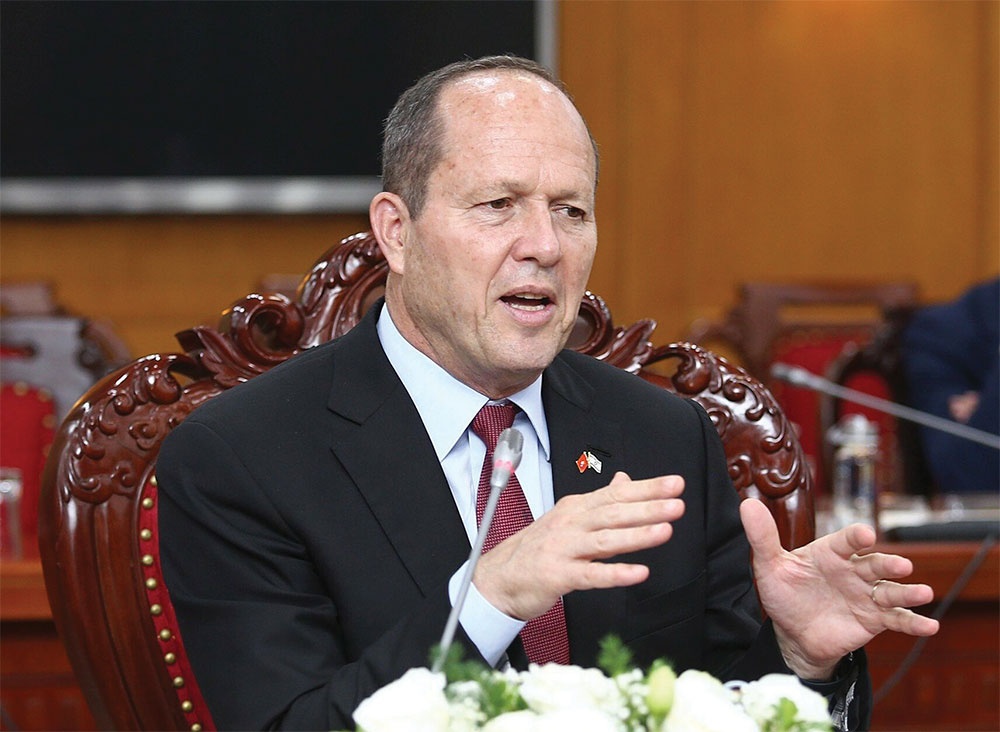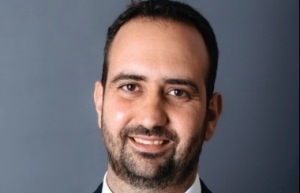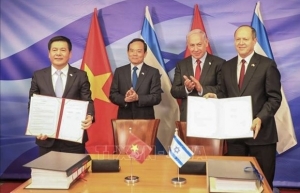Vietnam can pose as gateway for Israel’s Southeast Asian trade
In light of the evolving global landscape, which areas do you see holding the most potential for Vietnam-Israel collaborations?
The world faces several critical clusters of challenges, among which are the needs for enhanced high-tech sectors and improved health infrastructure. Additionally, the global demand for advanced agri-tech and food-tech is undeniable.
 |
| Nir Barkat, Israel’s Minister of Economy and Industry |
However, my immediate focus would be on what I interpret as the “eco-six”, referring to initiatives tied to sustainable ecological and agricultural practices.
Vietnam, with its deep-rooted agrarian culture, stands to benefit from this focus. By collaborating, we can significantly boost yields and empower Vietnamese farmers to achieve more.
Numerous Israeli companies are looking to expand their global footprint in this domain. Just recently, we learned of Vietnam’s ambitions to significantly upgrade its health services. This presents yet another collaborative avenue worth exploring. Moreover, with Vietnam positioned as a gateway to ASEAN, Israeli companies can tap into broader markets across Southeast Asia through Vietnam.
It is an unexploited business potential that, once harnessed, can be a game-changer for both nations. In essence, this is a symbiotic opportunity ripe for the taking.
Beyond the VIFTA, what additional support can Israeli businesses expect when collaborating with Vietnamese enterprises?
In the immediate term, there are two pivotal initiatives we should spearhead. First and foremost is the introduction of a direct flight. This is not merely about tourism, though it certainly opens doors for more visitors to explore the scenic vistas of Vietnam or for Vietnamese nationals to tread the hallowed grounds where biblical events unfolded.
Beyond the spiritual journey, there’s a pragmatic aspect: business. Currently, the travel time from Israel to Vietnam spans an exhausting 13.5 hours. A direct route would whittle that down to just eight hours, rendering business engagements far more feasible. Prime Minister Netanyahu, reflecting on our recently inked trade agreement, expressed eagerness to launch this direct connection, marking a transformative chapter in our bilateral ties.
The second initiative centres on fostering innovation and collaboration. Taking a leaf out of our play book with the United States and Canada, I propose the creation of a collaboration fund. Its essence is to fuel joint ventures between Israeli and Vietnamese companies.
By leveraging our technological prowess and pairing it with Vietnam’s marketing and sales dynamism, such ventures could yield remarkable outcomes. A joint fund, backed by both governments, would provide the financial impetus, ensuring entrepreneurs from both nations find collaborative business not just appealing but also lucrative.
Aquaculture is now a significant sector in Vietnam. Could you provide some insights into how it might be enhanced?
Certainly, it’s pivotal to focus on technology as the lynchpin. While Israel primarily exports technology, rather than products, let me illustrate with a couple of instances. In the southern region of our Negev, specifically in the city of Eilat, there is a renowned research institute proficient in domesticating fish from the Red Sea. They have mastered techniques to bolster the survival rate of fish eggs, resulting in a significantly enhanced yield.
Such expertise was harnessed a few decades ago in Israel, and our current endeavours are aimed at domesticating species like the bluefin and yellowfin tuna. This expertise holds immense potential in enhancing seafood production.
Moreover, Israel boasts of various innovative agricultural technologies. Take hydroponics, for example. Investing once in a hydroponic setup allows one acre of hydroponic farming to produce yields equivalent to traditional farming on 50 acres. This means that Vietnamese farmers, using these advanced technologies, can potentially multiply their produce manifold from the same plot of land.
Another innovation hailing from Israel is the inception of drip irrigation by Netafim. Originally conceived as a solution to water scarcity in the Negev desert, the contemporary model transcends mere irrigation. It’s now a sophisticated digital platform equipped with sensors, satellite imagery, drones, and other data-collection tools.
Following the introduction of an investment protection deal to complement Vietnam’s trade agreement with the EU, does Israel have any analogous initiatives in the pipeline?
While our primary focus has been on the VIFTA, in which we have progressed faster than the Europeans, we have ensured that investment protection is embedded within it. The VIFTA is one of our most comprehensive and advanced agreements. Building on this foundation, we are keen to explore collaboration similar to what we have done with countries like the US and Canada, and a few others.
Our aim is not just to partner with Vietnam, but to position it as a gateway to the broader ASEAN region. This strategy, if leveraged properly, can significantly benefit both Israel and Vietnam.
 | Israel and Vietnam on brink of substantial trade deal An upcoming free trade agreement between Israel and Vietnam is poised to unlock a new era of economic cooperation. Gal Saf, head of the Economic and Trade Mission under the Embassy of Israel in Vietnam, discussed with VIR’s Celine Luu the implications of the deal and how it could create a win-win scenario for businesses of the two countries. |
 | Vietnam, Israel sign free trade agreement Vietnamese Minister of Industry and Trade Nguyen Hong Dien and Israeli Minister of Economy and Industry Nir Barkat on July 25 signed the Vietnam - Israel Free Trade Agreement (VIFTA) in Tel Aviv in the presence of Vietnamese Deputy Prime Minister Tran Luu Quang and Israeli Prime Minister Benjamin Netanyahu. |
What the stars mean:
★ Poor ★ ★ Promising ★★★ Good ★★★★ Very good ★★★★★ Exceptional
Related Contents
Latest News
More News
- Hermes joins Long Thanh cargo terminal development (February 04, 2026 | 15:59)
- SCG enhances production and distribution in Vietnam (February 04, 2026 | 08:00)
- UNIVACCO strengthens Asia expansion with Vietnam facility (February 03, 2026 | 08:00)
- Cai Mep Ha Port project wins approval with $1.95bn investment (February 02, 2026 | 16:17)
- Repositioning Vietnam in Asia’s manufacturing race (February 02, 2026 | 16:00)
- Manufacturing growth remains solid in early 2026 (February 02, 2026 | 15:28)
- Navigating venture capital trends across the continent (February 02, 2026 | 14:00)
- Motivations to achieve high growth (February 02, 2026 | 11:00)
- Capacity and regulations among British areas of expertise in IFCs (February 02, 2026 | 09:09)
- Transition underway in German investment across Vietnam (February 02, 2026 | 08:00)

 Tag:
Tag:


















 Mobile Version
Mobile Version